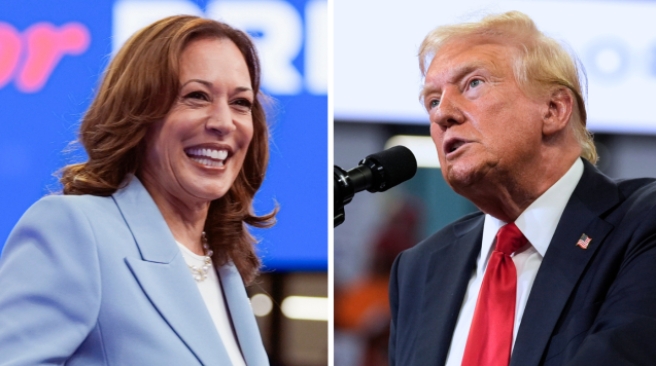
Vice President Harris has taken the lead over former President Trump in the national polling average kept by Decision Desk HQ/The Hill, underscoring how the new Democratic presidential candidate has quickly seen polls move in her favor.
The Harris lead in the DDHQ/The Hill poll is a narrow 0.3 points as of Monday, but it comes amid wider evidence that the newly-minted Democratic presidential candidate and her running mate, Minnesota Gov. Tim Walz (D), are moving up in the polls.
A poll released Saturday from The New York Times/Siena College gave Harris 4-point leads in Pennsylvania, Michigan and Wisconsin, three states that are part of the “blue wall” that swung the election to Trump in 2016 before flipping back for President Biden in 2020.
All are within the margin of error but mark notable improvements from Biden’s numbers.
Polling in the past week has given Harris her first lead in the DDHQ/The Hill average of Pennsylvania, which is the most electorally valuable of the battleground states with 19 electoral votes.
Another poll released Monday from a Democratic super PAC placed Harris 9 points ahead of Trump with voters 18 to 29 years old, a group Biden had struggled with, especially compared to recent Democratic performances with the youngest voters, while he was in the race.
Biden’s numbers with such demographics, coupled with his weakness to Trump in national and swing-state polls, led to serious doubts about his ability to win in November among Democrats. Worries for Democrats turned into a panic after Biden’s weak debate performance at the end of June.
The three weeks since Biden dropped from the race and endorsed Harris has seen a quick turn-around in polls.
On July 21, the day that Biden dropped out, Trump had a 2.3-point lead in the national polling average from Decision Desk HQ/The Hill in a head-to-head contest. Now, Harris has taken a 0.3-point lead. When independent candidate Robert F. Kennedy Jr. is added to the mix, Harris leads Trump by 3.7 points.
State-specific surveys have also given more hopeful indications for Harris than they did for Biden, who generally was trailing in the key states needed to win in the Electoral College by a slightly greater margin than on a national level.
Three other key states, Arizona, Georgia and Nevada, seemed to be moving away from Democrats when Biden was in the mix. Early evidence suggests Harris is closing the gap.
Polling has been somewhat limited in these states over the past couple weeks, but multiple polls have come out for each state at least putting Harris within the margin of error behind Trump, if not tied or slightly ahead.
A few polls showing the two candidates locked in a close race for Arizona, including a Morning Consult/Bloomberg poll that she led by 2 points, have shrunk Trump’s lead in the state from more than 5 points to 1.3 points.
An AARP poll published Thursday had Harris and Trump tied in Georgia, where Trump leads on average by 2.6 points.
Two Nevada polls placed the race for the state’s six votes as neck and neck.
Walz’s selection has also given Democrats a bit more comfortability in Minnesota, a state that has voted for the Democrat in presidential races for decades but one that Republicans had expressed hope could be targeted with Biden struggling.
Election handicapper Sabato’s Crystal Ball moved its rating of Minnesota from “Leans Democratic” to “Likely Democratic” on Wednesday based on Harris picking Walz and a couple polls showing it more safely in Democratic hands.
Republicans say Harris remains in a honeymoon period that will not last, and that her polling will come down to earth.
The Trump campaign’s pollster Tony Fabrizio released a memo soon after Harris joined the race predicting she will receive a boost in the polls from mostly positive coverage that energizes Democrats that lasts until the race “settles back down.” But he said this will not fundamentally change the race.
“She still hasn’t taken any questions from media. She’s done no interviews whatsoever, and she’s hiding from her record. You have to answer those questions at some point,” Oklahoma Sen. Markwayne Mullin (R) said on NewsNation’s “The Hill Sunday.”
Republicans, including Sen. JD Vance (R-Ohio), have pressed Harris on answering more questions about her policy positions and media outlets to hold her accountable for not yet sitting down for an interview. Harris said Thursday she wants to have a full interview by the end of the month.
All of this has still taken place before the Democratic convention next week, a major part of the election calendar that usually gives an extra bump in polling to the party. A small increase after the convention could raise Democratic hopes even further beyond the past few weeks.
The increase is often temporary, and a status quo may return at some point as Republicans predict. But the convention is just one of the several events on the horizon, along with possible Harris-Trump debates, that could further shake up the race in unpredictable ways.